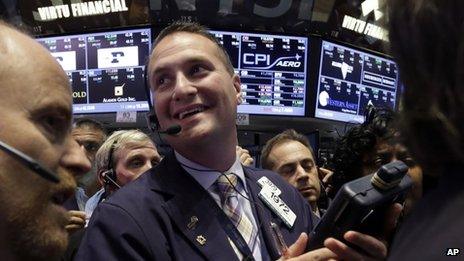Are the dangers of cheap money more visible?
- Published
- comments

All you need to know about the mad, precarious pricing of stock and bond prices was revealed today, in the impact of today's US GDP figures.
Now you might think the announcement that the US economy grew much slower than was originally thought in the first three months of the year - at a sluggish annual rate of 1.8%, compared with the initial peppy estimate of 2.4% - was bad news.
Not however for investors.
Share and bond prices in the US and Europe rose sharply.
And there was more gloomy news in Britain to cheer investors - in analysis by the Bank of England that many homeowners have excessive mortgage debts and an assessment by David Miles, a member of the Bank's monetary policy committee, that the British economy remains properly knackered.
So what on earth is going on? Why are the bad times so good for those punting on stocks and bonds?
Well it is because much of what has been supporting the price of financial assets is the glut of cheap money creating by central banks, led by the US Federal Reserve and Britain's Bank of England.
And what in recent days has been pulling down share and bond prices has been the public musings of Ben Bernanke, chairman of the Fed, that his alchemical creation of $85bn of new money every month might diminish later this year and terminate next year. (For more on this, see my previous blogs on Risks to financial system of interest rate rises and How the Fed bosses all.)
However, if the US economy is in fact weaker than Mr Bernanke and the Fed believe, then surely he will keep the cheap money tap gushing at full throttle for longer, or so investors reckon - which would then sustain the rising tide under stock and bond prices.
Also, the reflections of Mr Miles on Britain's economic anaemia reinforces the perception that the new governor of the Bank of England, Mark Carney, will keep British money as cheap as he can for as long as he can.
Or to put it another way, an absence of strong economic recovery means trebles all round, for investors.
Or does it?
The point is that what has happened today confirms that there is a significant speculative element in stock and bond prices, disconnected from economic reality.
This will have been noted by central bankers, who will become more anxious about the dangers of keeping the price of financial assets pumped up on cheap-money dope.
The point is that the more that the price of these assets is dependent on this dope, the greater the risk of calamitous financial shock as and when the dope is withdrawn.
Which is why the Bank of England has today decided to put all Britain's banks and big insurers through the scanner, to discover how badly they would be hurt by a short, sharp end to cheap money (a rapid rise in interest rates and its corollary, a collapse in bond prices).
So in a way, the case for an orderly unwinding of quantitative easing, of money creation, has been reinforced by today's evidence of markets' addiction to the drug of under-priced money.
And even if central bankers haven't learned this lesson, wiser investors will have done.
Which brings the risk that to prevent bond and stock prices from relentlessly and remorselessly falling, central banks would actually have to create more money - precisely the opposite of what they would choose.